4 Books That Capture the Beautiful Complexity of Marriage
One happily married man—and author of Last Day on Earth—shares the novels that reveal what marriage is really like, long after the storybook wedding.
By Eric Puchner
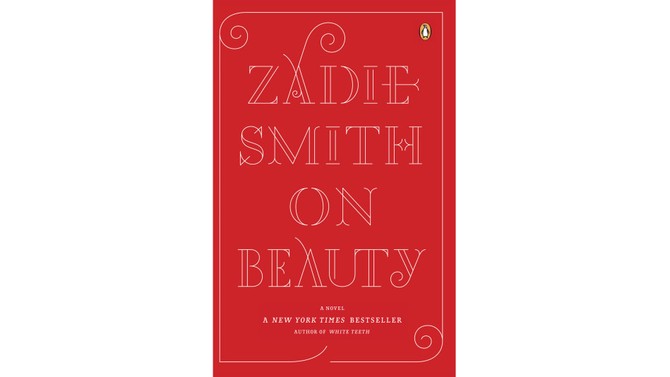
By Zadie Smith
464 pages; Penguin Books
Zadie Smith's very loose retelling of E.M. Forster's Howards End centers on the fraying union between Kiki and Howard, an interracial couple whose marriage is gravely wounded due to Howard's affair with a colleague at the university where he teaches. As well as being a complicated portrait of infidelity—Howard loves Kiki deeply, despite his failure as a husband—it's also a book about beauty itself. In Kiki and Howard's case, it's about the loss of it and what it means to grow old together, to find (or not find) a deepening beauty in your partner's journey through middle age, their gradual imprisonment in an alien body. (As Kiki says, "I'm not going to be getting any thinner or any younger, my ass is gonna hit the ground, if it hasn't already—and I want to be with somebody who can still see me in here. I'm still in here.") The scene that I think about most often, though, is the moment late in the book when Kiki and Howard finally have the colossal fight they've been avoiding, and then Kiki says something accidentally comic—"I never did. You did. When you did what you did"—and they both start cracking up over the "overabundance of 'dids.'" Which leads, of course, to their screwing on the floor. They go from hate to love in six seconds flat. I know a long-married couple who keep two pairs of Groucho Marx glasses handy in the house so that when they have a particularly bad fight, they can put the glasses on, which inevitably reduces them to giggles. But I've found that my wife and I are always one moment away from making each other laugh. We just have to remember to look closely enough. Smith perfectly captures the hair's distance between fury and affection, desire and disgust, sorrow and bliss.
464 pages; Penguin Books
Zadie Smith's very loose retelling of E.M. Forster's Howards End centers on the fraying union between Kiki and Howard, an interracial couple whose marriage is gravely wounded due to Howard's affair with a colleague at the university where he teaches. As well as being a complicated portrait of infidelity—Howard loves Kiki deeply, despite his failure as a husband—it's also a book about beauty itself. In Kiki and Howard's case, it's about the loss of it and what it means to grow old together, to find (or not find) a deepening beauty in your partner's journey through middle age, their gradual imprisonment in an alien body. (As Kiki says, "I'm not going to be getting any thinner or any younger, my ass is gonna hit the ground, if it hasn't already—and I want to be with somebody who can still see me in here. I'm still in here.") The scene that I think about most often, though, is the moment late in the book when Kiki and Howard finally have the colossal fight they've been avoiding, and then Kiki says something accidentally comic—"I never did. You did. When you did what you did"—and they both start cracking up over the "overabundance of 'dids.'" Which leads, of course, to their screwing on the floor. They go from hate to love in six seconds flat. I know a long-married couple who keep two pairs of Groucho Marx glasses handy in the house so that when they have a particularly bad fight, they can put the glasses on, which inevitably reduces them to giggles. But I've found that my wife and I are always one moment away from making each other laugh. We just have to remember to look closely enough. Smith perfectly captures the hair's distance between fury and affection, desire and disgust, sorrow and bliss.
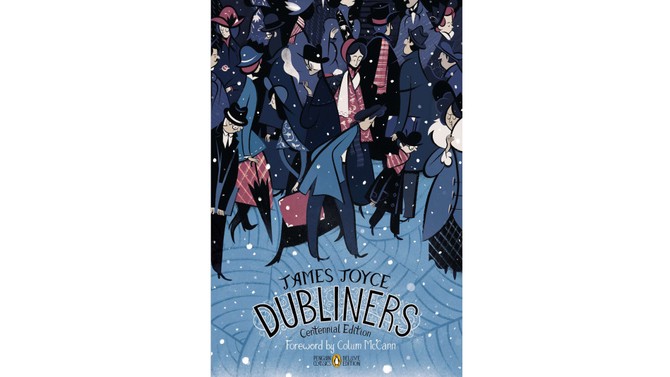
"The Dead" in Dubliners
By James Joyce
336 pages; Penguin Classics
Maybe the greatest short story ever written, "The Dead"—which appears in the 1914 collection Dubliners by James Joyce—focuses on an evening in the life of Gabriel Conroy, teacher and book critic, who goes to a party with his wife of many years, Gretta. Toward the end of the story, as the two of them are getting ready to leave, Gabriel catches sight of Gretta on the stairs, listening to some "distant music" that he can't hear. The sight of her like that, graceful as the figure in a painting, kindles in him a litany of memories from when they were young and in love, before their life together was dulled by routine. He realizes that "their children, his writing, her household cares had not quenched all their soul's tender fire." Less lyrically, he wants to get her into the sack as soon as he can. Joyce perfectly captures the way an unexpected context—a party, a hike in the woods, a strange moment on the stairs—can re-mystify your spouse and cut through the dailiness of married life. But then Gabriel and Gretta return to their hotel room, and Joyce delivers the kicker: The mystery Gabriel read in his wife's face wasn't what he (or we) had in mind at all. She'd been thinking about an old lover, Michael Furey, who died of illness at the age of 17, possibly because he risked his life to visit her in the rain. She'd been dreaming about someone else. And Gabriel, though seething with "rage and desire," consoles Gretta tenderly and caresses her hand, facing one of the hardest truths about marriage: You will never, ever truly know what your spouse is thinking. Personally, I find this both terrifying (my wife will always be a stranger to me) and comforting (my wife will always be a stranger to me, and therefore of inexhaustible interest).
336 pages; Penguin Classics
Maybe the greatest short story ever written, "The Dead"—which appears in the 1914 collection Dubliners by James Joyce—focuses on an evening in the life of Gabriel Conroy, teacher and book critic, who goes to a party with his wife of many years, Gretta. Toward the end of the story, as the two of them are getting ready to leave, Gabriel catches sight of Gretta on the stairs, listening to some "distant music" that he can't hear. The sight of her like that, graceful as the figure in a painting, kindles in him a litany of memories from when they were young and in love, before their life together was dulled by routine. He realizes that "their children, his writing, her household cares had not quenched all their soul's tender fire." Less lyrically, he wants to get her into the sack as soon as he can. Joyce perfectly captures the way an unexpected context—a party, a hike in the woods, a strange moment on the stairs—can re-mystify your spouse and cut through the dailiness of married life. But then Gabriel and Gretta return to their hotel room, and Joyce delivers the kicker: The mystery Gabriel read in his wife's face wasn't what he (or we) had in mind at all. She'd been thinking about an old lover, Michael Furey, who died of illness at the age of 17, possibly because he risked his life to visit her in the rain. She'd been dreaming about someone else. And Gabriel, though seething with "rage and desire," consoles Gretta tenderly and caresses her hand, facing one of the hardest truths about marriage: You will never, ever truly know what your spouse is thinking. Personally, I find this both terrifying (my wife will always be a stranger to me) and comforting (my wife will always be a stranger to me, and therefore of inexhaustible interest).
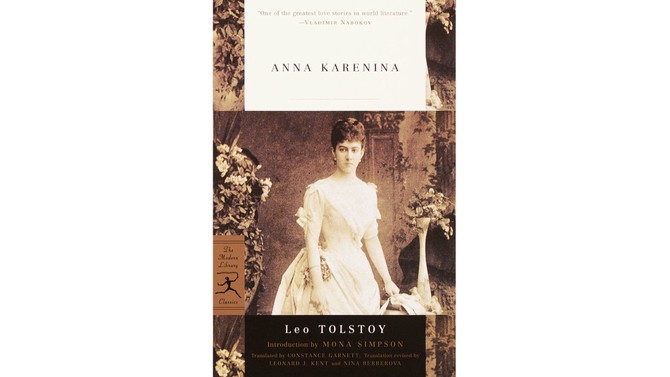
By Leo Tolstoy
872 pages; Penguin Classic
Although readers often talk about the least happy marriage in Tolstoy's masterpiece—that between Karenin and Anna, destroyed by her doomed affair with the dashing Vronksy—I've always been most interested in the less-famous but far happier marriage between Levin and Kitty, which seems in many ways to refute Tolstoy's premise by being so utterly, beautifully joyful. There's the scene in which Levin proposes to Kitty in secret code, playing "secretary" during a dinner party, writing the first letters of each word on the table until it seems like they're speaking to each other through ESP—surely the oddest and most romantic marriage proposal in all of literature. And then there's the wedding itself, which captures the temporary insanity of one's wedding day like nothing else I've read: Levin's nearly missing the ceremony because he doesn't have a clean shirt to wear, and then both of them so demented with euphoria during the ceremony that they can't figure out which ring is supposed to go on whose finger. But the real brilliance of Tolstoy's portrait, for me, comes later in the book, after Levin has started a family and achieved domestic bliss with Kitty on his estate; despite getting the girl of his dreams, or perhaps because of it, Levin often finds himself blinded with despair, wondering "what he was and why he was living in the world." If anything, his happy marriage has opened his soul to these questions, and made them more pressing. Why? Perhaps now that he has solved the problem of his loneliness—and found someone to share his life on earth with—he is free to wonder about his place in the universe. It's as if Tolstoy is trying to show us that, no matter what Levin might believe, marital happiness and personal happiness aren't the same thing. My takeaway: It's a mistake to think that finding the perfect mate will answer your deepest existential doubts (why am I here?), or to think that a marriage that fails to do so is a failure.
872 pages; Penguin Classic
Although readers often talk about the least happy marriage in Tolstoy's masterpiece—that between Karenin and Anna, destroyed by her doomed affair with the dashing Vronksy—I've always been most interested in the less-famous but far happier marriage between Levin and Kitty, which seems in many ways to refute Tolstoy's premise by being so utterly, beautifully joyful. There's the scene in which Levin proposes to Kitty in secret code, playing "secretary" during a dinner party, writing the first letters of each word on the table until it seems like they're speaking to each other through ESP—surely the oddest and most romantic marriage proposal in all of literature. And then there's the wedding itself, which captures the temporary insanity of one's wedding day like nothing else I've read: Levin's nearly missing the ceremony because he doesn't have a clean shirt to wear, and then both of them so demented with euphoria during the ceremony that they can't figure out which ring is supposed to go on whose finger. But the real brilliance of Tolstoy's portrait, for me, comes later in the book, after Levin has started a family and achieved domestic bliss with Kitty on his estate; despite getting the girl of his dreams, or perhaps because of it, Levin often finds himself blinded with despair, wondering "what he was and why he was living in the world." If anything, his happy marriage has opened his soul to these questions, and made them more pressing. Why? Perhaps now that he has solved the problem of his loneliness—and found someone to share his life on earth with—he is free to wonder about his place in the universe. It's as if Tolstoy is trying to show us that, no matter what Levin might believe, marital happiness and personal happiness aren't the same thing. My takeaway: It's a mistake to think that finding the perfect mate will answer your deepest existential doubts (why am I here?), or to think that a marriage that fails to do so is a failure.
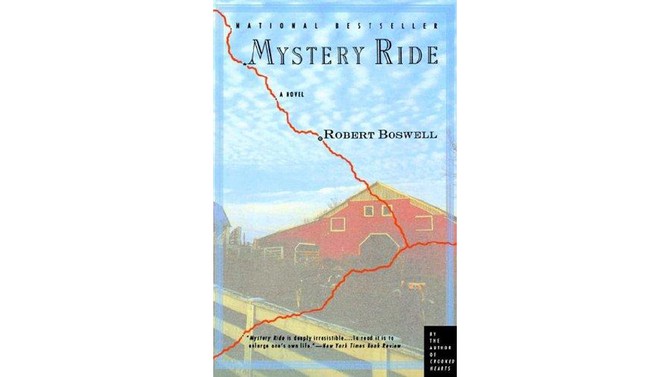
By Robert Boswell
334 pages; Quartet Books Ltd
Published in the early '90s, this is a novel that I wish more people would read. The title is from a Bruce Springsteen song (Would they ever look so happy again / The handsome groom and his bride / As they stepped into that long black limousine / For their mystery ride), and one of its major themes is the idea that love isn't a finite experience with a beginning and an end. The novel follows the divergent trajectories of Angela and Stephen Landis 11 years after their divorce, when Stephen is living on a farm in Iowa and Angela is living in L.A. with their troubled daughter, each of them involved with someone else. It's a beautiful book, full of "the almost inexhaustible mystery of love found and lost.'' The chapter that gets me the most, however, is when the pregnant Angela and Stephen get together one Christmas Eve in Arizona, sans partners, and Angela goes unexpectedly into labor. Stephen has to drive her to the hospital, and Angela, looking at "his steady hands on the wheel," realizes that "this is the man I have loved best ... and this is the man who has loved me best." At the hospital, Stephen holds her hand during her contractions, and it's as if they're still married, as if she's delivering Stephen's baby and not her husband's and they've gone through some magic portal and become doppelgängers of themselves. But then the contractions end—a false alarm—and they both realize that true love and marriage aren't necessarily compatible: "Love did not really conquer all. It didn't, and it shouldn't." It's this "shouldn't" that seems especially wise to me: Loving someone and finding a workable life with him aren't necessarily the same thing. A happy marriage is partly, then, a lucky one. What are the odds for love and life to align? I always finish Boswell's novel with a feeling of great good fortune, but also with the disquieting awareness that the merging of two lives into one is an improbable thing to begin with, a strange and beautiful gamble.
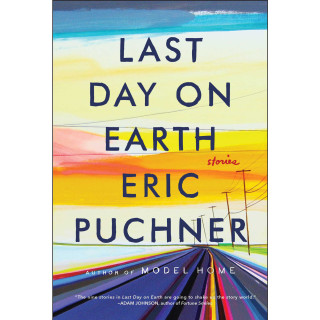
Eric Puchner is the author of Last Day on Earth, Music Through the Floor and Model Home.
Want more stories like this delivered to your inbox? Sign up for the Oprah's Book Club Newsletter!
334 pages; Quartet Books Ltd
Published in the early '90s, this is a novel that I wish more people would read. The title is from a Bruce Springsteen song (Would they ever look so happy again / The handsome groom and his bride / As they stepped into that long black limousine / For their mystery ride), and one of its major themes is the idea that love isn't a finite experience with a beginning and an end. The novel follows the divergent trajectories of Angela and Stephen Landis 11 years after their divorce, when Stephen is living on a farm in Iowa and Angela is living in L.A. with their troubled daughter, each of them involved with someone else. It's a beautiful book, full of "the almost inexhaustible mystery of love found and lost.'' The chapter that gets me the most, however, is when the pregnant Angela and Stephen get together one Christmas Eve in Arizona, sans partners, and Angela goes unexpectedly into labor. Stephen has to drive her to the hospital, and Angela, looking at "his steady hands on the wheel," realizes that "this is the man I have loved best ... and this is the man who has loved me best." At the hospital, Stephen holds her hand during her contractions, and it's as if they're still married, as if she's delivering Stephen's baby and not her husband's and they've gone through some magic portal and become doppelgängers of themselves. But then the contractions end—a false alarm—and they both realize that true love and marriage aren't necessarily compatible: "Love did not really conquer all. It didn't, and it shouldn't." It's this "shouldn't" that seems especially wise to me: Loving someone and finding a workable life with him aren't necessarily the same thing. A happy marriage is partly, then, a lucky one. What are the odds for love and life to align? I always finish Boswell's novel with a feeling of great good fortune, but also with the disquieting awareness that the merging of two lives into one is an improbable thing to begin with, a strange and beautiful gamble.

Eric Puchner is the author of Last Day on Earth, Music Through the Floor and Model Home.
Want more stories like this delivered to your inbox? Sign up for the Oprah's Book Club Newsletter!
Published 04/19/2017

